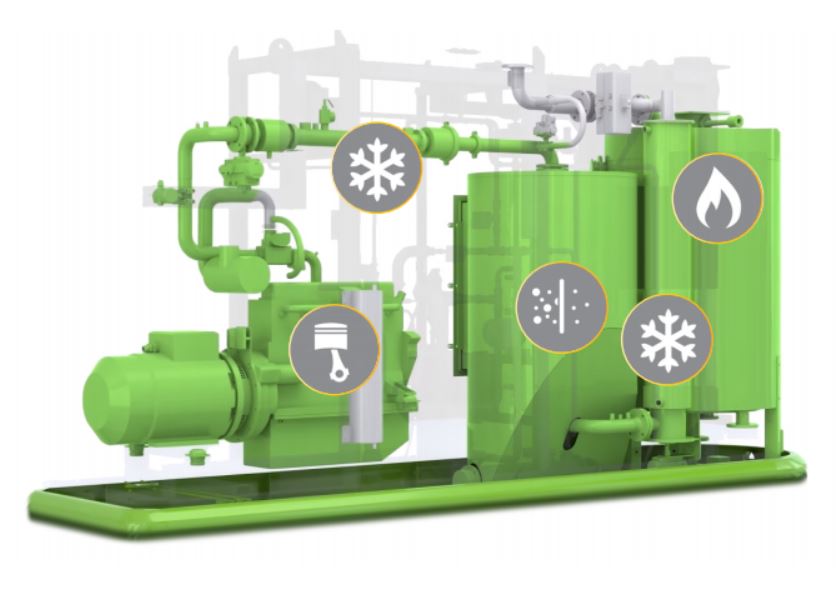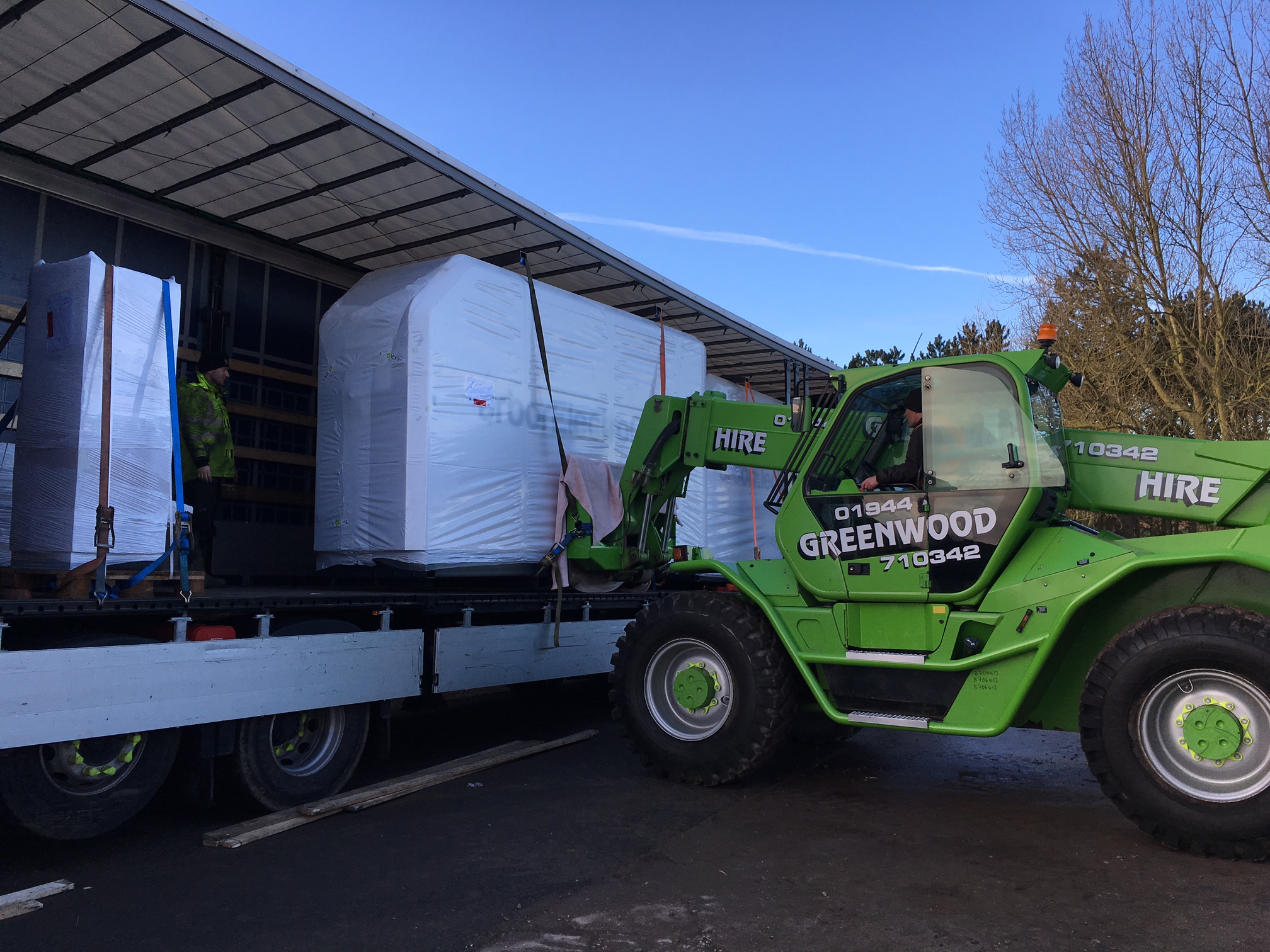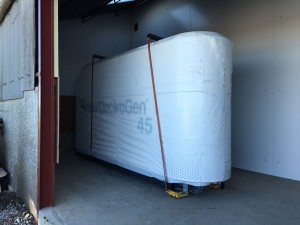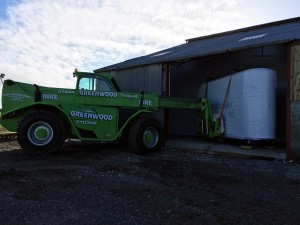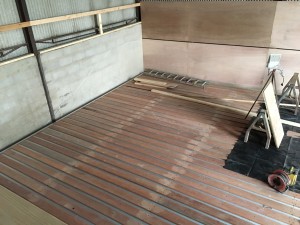News Filter
Date
-
2011
-
2012
-
2013
-
2014
-
2015
-
2016
-
2017
-
2018
-
2019
-
2020
-
2022
News
New engineering appointment boosts CHP team
 Earthmill has expanded its specialist CHP team with the appointment of a new heating design engineer.
Earthmill has expanded its specialist CHP team with the appointment of a new heating design engineer.
Nigel Farr has joined the business to focus on Earthmill’s newest area of expertise, combined heat and power (CHP), which is delivering high efficiency renewable energy to farms and businesses across Yorkshire, Cheshire and Mid and North Wales.
Nigel has moved his family to Yorkshire from Cornwall to take up the position with Earthmill. Originally from Doncaster, he has 27 years’ engineering experience, including five years in the renewables sector, working for environmental technology businesses including South West-based Eco Nrg.
He said: “Earthmill’s expertise in the farm-scale wind turbine sector is second to none, and the company is fast gaining a reputation for excellence at the cutting edge of new CHP technology. It’s an exciting time to be joining the business as they make real strides in this exciting new low-carbon field and I’m looking forward to working with farmers and other businesses to help them tap into this fantastic green resource.”
Steve Milner, Earthmill managing director, said: “Although still relatively new to the UK market, CHP is taking off fast, particularly among high energy consumers such as pig and poultry farmers. Its ultra-high power efficiency comes from the fact that CHP captures, and then uses the heat created by burning woodchip biomass to generate electricity, in a very streamlined process which can be as much as 90 per cent efficient.”
Earthmill’s Arbor Electrogen CHP units were the first small-scale CHP systems accredited by Ofgem to qualify for government subsidies and offer a return on investment in under five years. Costing £22,000 to £35,000 a year in woodchip to run, the units have the capacity to generate around £80,000 worth of heat and electricity, producing a £40,000 net profit. Energy-intensive businesses can expect paybacks of up to £100,000.
News Filter
Date
-
2011
-
2012
-
2013
-
2014
-
2015
-
2016
-
2017
-
2018
-
2019
-
2020
-
2022
News
Farmers turn to CHP to recoup losses of failed Anaerobic Digestion projects
“As well as providing energy security for our dairy, the CHP plants will recover what we invested in a planning application for an AD plant.”
Hundreds of farmers in planning for Anaerobic Digestion (AD) plants were recently stung by heavy cuts to the Feed-In Tariff, making their projects financially unviable.Now farmers and land owners are turning to biomass Combined Heat and Power (CHP) to recoup their losses and generate their own energy on site.
Depending on the scale of the development, the Arbor ElectroGen 45 biomass CHP plant does not necessarily need planning permission and qualifies for two types of Government incentives: the long-running Renewable Obligation Scheme (ROCs) for the electricity produced and the generous Biogas Renewable Heat Incentive (RHI). Operators can see net returns of up to £85,000 per annum and 15-20% IRR over the lifetime of the investment making it an attractive option for anyone who was affected by the FiT cuts or anyone that failed in planning for AD.
Welsh Farmer comes out on top following FiT drop
Earthmill client Aled Lewis is currently installing 4 of the Arbor ElectroGen 45 plants at his dairy farm in Mid Wales after cuts in the Feed-in Tariff rendered his planning application for an AD plant financially unviable to pursue. The installation is powering the farms dairy operation as well as providing heat to a Wellvent drying floor to dry and supply woodchip. Aled will soon welcome farmers to his site to showcase the technology, allowing visitors to learn how they too can benefit from the generous Government incentives that are available for biomass CHP plants.
Aled Lewis commented, “As well as providing energy security for our dairy, the CHP plants will recover what we invested in a planning application for an AD plant here on the farm.”
Earthmill are currently offering free site assessments for farmers and business owners interested in installing CHP in Yorkshire, Cheshire and Wales. Click here to request your site assessment.
News Filter
Date
-
2011
-
2012
-
2013
-
2014
-
2015
-
2016
-
2017
-
2018
-
2019
-
2020
-
2022
News
Earthmill expands with new wind turbine management division
Wetherby-based renewables specialist, Earthmill, the country’s largest agricultural wind turbine business, has expanded with the launch of a new division dedicated to servicing and maintaining wind turbines, to help maximise returns from wind power for farms across the UK.
The £15m turnover business, which has installed more than 250 ‘farm-scale’ turbines since it was launched out of managing director Steve Milner’s garage in 2009, has invested in new staff and technology in response to the high demand for assistance from turbine owners whose initial service warranties have expired.
Earthmill has won more than 20 new service and maintenance contracts in the last few months and expects to have gained at least a further 50 by the end of this year.
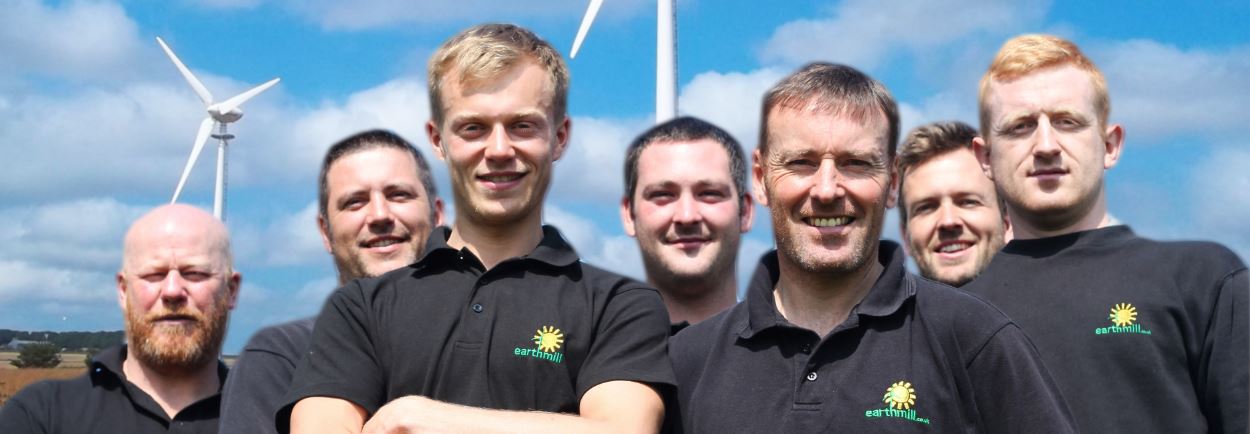
With a 14-strong team of engineers deployed nationally, and further hires expected later this year, Earthmill has also invested in a new on-site high-tech control centre at its Wetherby head office. The technology provides a detailed, real-time report of local wind speeds and power outputs of each turbine as well as pre-empting and instantly logging any technical problems
The system enables the team to react immediately to problems, either fixing issues from the Wetherby control centre or deploying their nearest engineer to the faulty turbine whatever time of day problems occur.
Earthmill managing director, Steve Milner, said: “When something goes wrong with a turbine, speed and technical expertise are essential to avoid costly downtime for turbine owners, who need their machine to be producing power at every opportunity. This investment in technology allows us to gather the levels of data necessary to ensure our clients are constantly getting the maximum out of their wind turbine investments.”
Mr Milner added: “We’ve put together a turbine management package for clients, specifically designed to take that stress away from farmers, who have more than enough to worry about already.
“There are a lot of basic maintenance deals on the market now but we take a holistic and more proactive approach to looking after each turbine site. While the industry average availability, or uptime, rate is 95 per cent, the rate for the turbines that Earthmill services and maintains is 98 per cent, thanks to our highly experienced team.
“Typically that extra 3 per cent means an additional £2,000 a year in revenue for hard-pressed farmers who need to maximise their farm income,” said Mr Milner.
Earthmill’s turbine management package also includes managing clients’ power purchase agreements, which can achieve an average 0.5p above the standard market rate, equating to up to £3,000 in additional annual income. The company also advises on business rates and insurance for turbines.
News Filter
Date
-
2011
-
2012
-
2013
-
2014
-
2015
-
2016
-
2017
-
2018
-
2019
-
2020
-
2022
News
What gives the Arbor ElectroGen 45 the edge?
The Arbor ElectroGen 45 uses less fuel to produce more energy than any other biomass CHP plant currently available. Couple this with a less frequent maintenance schedule allowing more time for energy generation and it is no wonder farmers and landowners are looking no further than the Arbor ElectroGen 45.
The intelligent design of the gasifier within the Arbor ElectroGen 45 plant is what makes it all possible and why the Arbor unit can offer unrivalled returns. This is how it does it:
Temperature management
Most gasifiers suffer from ‘cool spots’ and therefore struggle to reach the very high temperatures required to reach gasification. This is due to only cool air being fed into the gasifier as well as the fuel becoming a clogged mass in the centre and restricting airflow. The Arbor unit is built using high grade insulating steel and extra insulation. The plant requires a large woodchip which allows for airflow between the fuel. Air is pre-heated before it enters the gasifier to raise the temperature and an additional air inlet feeds the pre-heated air into the centre of the gasifier resulting in an even temperature throughout the gasification chamber. For these reasons the Arbor ElectroGen produces a syn-gas with a higher calorie value making it the most fuel efficient biomass CHP plant available.
Zero Tar
Tar has always been an issue with gasification systems, however the Arbor ElectroGen has overcome this problem in two ways. Firstly the extremely high temperatures achieved in the gasifier create an environment where tar is unable to form. Secondly, whereas most other gasifiers extract syn-gas at the same point as where the ash is removed, the Arbor plant uses separate extraction points resulting in a much cleaner gas with fewer solid particles to be filtered out before being used as fuel for the engine.
Greater availability for generation
The Arbor gasifier uses a microwave sensor that doesn’t require regular maintenance and cannot jam like the equivalent mechanical devices used to manage the amount of fuel that is fed into the chamber. With fewer moving parts, virtually zero-tar production and no fuel clogging the Arbor gasifier requires significantly less service and maintenance. This is important as a gasifier can take several days to cool down before it is able to be serviced. It is for this reason we are able to account for 8,000 hours of up time per annum allowing our clients to generate more heat and power as well as greater subsidy returns.
You can find out more about the Arbor ElectroGen here or get a breakdown of typical annual returns and costs here. Alternatively, why not take advantage of our free site assessment service here.
News Filter
Date
-
2011
-
2012
-
2013
-
2014
-
2015
-
2016
-
2017
-
2018
-
2019
-
2020
-
2022
News
How To Squeeze The Most From Your Wind Turbine
There are only really a small number of factors which can affect the production value and efficiency of a wind turbine once it’s in the ground and generating electricity:
- Operating condition
- Availability
- Weather
There’s not much you can do about the weather but you can make a huge difference to your annual returns by selecting the right wind turbine maintenance package to suit your needs. These are the key areas where the right package will really make a difference to your revenue:
Maintenance response
From time to time you wind turbine is likely to need unplanned maintenance. It’s absolutely key that your maintenance team are able to respond quickly as every hour your turbine is down is another hour you’re not generating power and revenue.
We stay on top of response time in three ways:
- We monitor our entire Endurance fleet live from our head office, so we can pre-empt most problems occurring. We can fix most issues remotely and if that can’t be done we dispatch an engineer.
- Our team of engineers all carry vehicle trackers, so in the event that a site visit is required we can see which engineer is closest to you and direct them straight to your site.
- Finally, we operate an out of hours emergency phone number and email address, so you can always reach us if you need to.
The industry up-time average for farm scale wind turbines is 95%. Earthmill are proud to maintain an up-time average of 98%, which roughly calculates to an additional £2,000 return each year (based on a 55kW wind turbine).
“I rang Earthmill concerned that my turbine had stopped working. They were able to tell me that lightning had struck my turbine during the night and that not only had they already dispatched an engineer, but that the engineer was finished, on his way off the property and the turbine was already operational again!”
Peter Beal, February 2016
Servicing Quality
Servicing quality is key in keeping your wind turbine running and generating as efficiently as possible. Your company of choice should use the best approved parts and engineers should be fully trained and certified to do the job.
Dedicated Service & Maintenance Engineers
Earthmill operate a team of dedicated, fully certified wind turbine engineers, with over 65 years of industry experience. We also own and maintain the largest fleet of maintained turbines in the UK, making Service & Maintenance is a very important part of our business.
Our policy of continuous training and our excellent working relationship with turbine manufacturers mean that we are always at the forefront of best practice when it comes to keeping your turbine running reliably.
Our wind turbine maintenance service currently covers the following makes: Endurance, Gaia, Kingspan and Proven.
If your wind turbine is already out of or close to leaving its manufacturer warranty, or your current package is coming to an end, we’d love you to get in touch for a brief conversation about our Service Packages. Alternatively, you can request a free desktop site assessment online.
News Filter
Date
-
2011
-
2012
-
2013
-
2014
-
2015
-
2016
-
2017
-
2018
-
2019
-
2020
-
2022
News
Practical uses for CHP heat
The heat generated by biomass CHP can be put to use for most industrial or commercial requirements but there are rules in order to qualify for the Government backed Renewable Heat Incentive (RHI). Below are 5 great examples of how you can use heat produced by a biomass CHP installation and still qualify for RHI payments.
1. Drying fuel
As the number of CHP installations continue to gather momentum across the UK, we’re finding that many landowners are opting to direct some of their CHP generated heat to drying their own fuel. Wet fuel can be purchased for around 50% of the price of pre-dried fuel, making this a popular use of CHP heat – especially if existing heat requirements are relatively low pre-installation.
In addition to lowering your own fuel costs, becoming a fuel supplier to other CHP owners is an excellent additional long-term revenue stream.
2. Farrowing & poultry sheds
CHP is tailor made for businesses with both high heat and high power requirements, such as pig and poultry producers. The heat produced can easily be integrated into new or existing water-based heat mats or underfloor heating systems for application in farrowing or poultry sheds.
Arbor ElectroGen 45 is particularly well suited for uses which require heat availability throughout the entire year, as the unit is designed to run around the clock for 8000 hours per year.
3. Greenhouses & nurseries
Businesses that require a large amount of heat have suffered from the ever increasing cost of energy, particularly during the cooler winter months. Ornamental plant growers and food producers with glass houses are prime examples.
CHP still makes a huge amount of financial sense for these kinds of businesses even when additional heat is only required for part of the year. Excess heat is often put to work for new purposes, such as drying fuel for the remainder of the year. Even without an additional heat use to claim full RHI, CHP returns are still excellent.
4. Holiday cottages, camp sites and swimming pools
Sustainable energy generated locally has long been a popular option for powering holiday accommodation. Where CHP really stands out is that it can also heat your holiday lets and any accompanying facilities such as clubhouses or heated swimming pools.
The continuous nature of CHP production makes it a fantastic option for this sort of use. The electricity you generate is available for your tenants’ use and any additional can sold to the grid at the export rate.
5. Workshops, factories and industrial / commercial properties
CHP is a relatively compact technology which can be safely and easily housed inside as well as outside. For larger facilities and estates, several ArborGen 45 can be installed in unison to take on larger heating and power requirements, making CHP a good option for industrial properties and factories.
If you’d like to learn more about CHP or find out if your heat requirements qualify for RHI, then you can see a breakdown of potential returns here or contact our team on 01937 581011 for more information and a free desktop site survey.
News Filter
Date
-
2011
-
2012
-
2013
-
2014
-
2015
-
2016
-
2017
-
2018
-
2019
-
2020
-
2022
News
RHI incentives fall as farmers and landowners flock to cash in on CHP revenue
The announcement this week that the Renewable Heat Incentive (RHI) biogas tariff category has beaten targets by almost 90%, shows how attractive combined heat and power (CHP) systems are becoming to farmers, despite triggering a 10% degression in the incentive from April 2016.
The data released by the Department of Energy and Climate Change (DECC) show the rapid growth in popularity of biogas and CHP systems in recent months. The news is already driving more landowners and farmers to contact us to evaluate the technology as a new source of income and energy cost reduction on their farms.
The fact that the incentive target for 2016 was smashed by £8.8m, almost doubling it, clearly signals the take up rate of the technology is accelerating across the UK, and backs up what Earthmill is seeing on the ground at farms in the North of England and Wales.
The recent take-up of CHP is credited to advances in technology that have made commercial CHP systems increasingly practical, generating a return of 15%-20% per annum for some agricultural users of heat and power.
In the last six months we have started to work with more than 50 farmers and land owners in the North of England and Wales who are keen to install systems to generate power, heat and revenue.
The 10% reduction in the tariff which takes place from 1 April 2016 is triggering a rush for installations of the Finnish-made Volter (or Arbor ElectroGen) biomass CHP systems by farmers that had started the process and who were already close to installation and grid connection.
If you haven’t started working to investigate the returns or install a unit yet, it’s the best time to look at the technology now before the next degression in July, while the incentives are still very good, and the returns are attractive.
To request a free CHP site assessment you can submit your details online or contact us on 01937 581011. Alternatively check out the potential current returns for CHP here.
News Filter
Date
-
2011
-
2012
-
2013
-
2014
-
2015
-
2016
-
2017
-
2018
-
2019
-
2020
-
2022
News Filter
Date
-
2011
-
2012
-
2013
-
2014
-
2015
-
2016
-
2017
-
2018
-
2019
-
2020
-
2022
News
Check out the new Volter CHP video
Check out this brand new video from Volter to learn more about our CHP plants:
Learn more about CHP here or contact us for a complimentary site assessment.
News Filter
Date
-
2011
-
2012
-
2013
-
2014
-
2015
-
2016
-
2017
-
2018
-
2019
-
2020
-
2022
News
Top 5 reasons to visit YAMS this week
It’s nearly time for Yorkshire’s premier agricultural machinery show, YAMS. Here are our top five reasons why we love (and why you shouldn’t miss) it.
1. Great food
Make your way to the food marquee or café upon arrival and fuel up for the day ahead with a hearty hot breakfast! There is plenty available and you’ll be spoilt for choice when you go back for lunch, with an array of freshly cooked / baked / roasted options – all mouthwatering!
2. Free entry and parking onsite
YAMS is completely free to attend and you can park for free too. The event is held at the York Auction Centre in Murton and will feature approximately 200 exhibitors this year.
3. Free farmer health checks
The Yorkshire Rural Support Network will be offering free farmer health checks on stand MK125. A perfect opportunity for farming professionals who put in long working hours to kill two birds with one stone.
4. Grab a bargain
Catch up with your local dealers and traders, take a look at new machinery models, source replacement parts and maybe grab a bargain, with plenty of exhibitors offering show discounts, prizes and special deals. In addition, if you have been affected by the recent flooding then Thornton Breakers are kindly giving away free haylage and silage bales to support the recovery effort.
5. The Earthmill Team will be there!
Come and visit Earthmill on stand G5 to find out how you can earn up to £100,000 a year by generating your own heat and power with CHP. CHP is an exceptionally efficient method of generating sustainable energy and does not require formal planning. The technology is designed to be integrated directly into your business, providing heat where you need it most and power which can be used onsite or exported back to the grid. Both on and off-grid options are available.
If you’re a wind turbine owner then please come and talk to us about how Earthmill increase your turbine availability with our industry leading Service & Maintenance packages.
YAMS takes place on Wednesday 3rd of February and the gates open at 8.30am. You can find out more by visiting the YAMS website or plan your journey here.
See you at YAMS!


